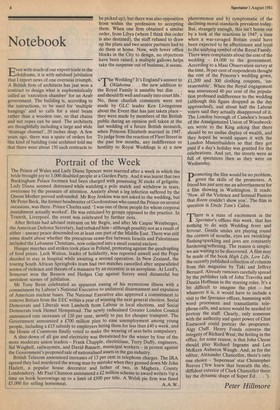Notebook
'Even with much of our export trade in the JL. doldrums, it is with subdued jubilation that I report news of one overseas triumph. A British firm of architects has just won a contract to design what is euphemistically called an 'execution chamber' for an Arab government. The building is, according to the instructions, to be used for 'multiple hangings' and so calls for a steel beam rather than a wooden one, so that chains and not ropes can be used. The architects are thoughtfully including a large and Wide 'drainage channel', 20 inches deep. A few years ago, there was a spate of orders for this kind of building (one architect told me that there were about 150 such contracts to be picked up); but there was also opposition from within the profession to accepting them. When one firm obtained a similar order, from Libya (where I think this order is also destined), the staff refused to draw up the plans and two senior partners had to do them at home. Now, with fewer office blocks in the City to design, no objections have been raised; a multiple gallows helps take the suspense out of business, it seems.
rr he Wedding? It's England's answer to 1 Oklahoma . . . the new addition to the Royal Family is amiable but dim . . . and should fit well and easily into court life.' No, these churlish comments were not made by GLC leader Ken Livingstone about the Event that has just taken place — they were made by members of the British public during an opinion poll taken at the last wedding of a future British monarch, when Princess Elizabeth married in 1947. To judge from the reaction of Fleet Street in the past few months, any indifference or hostility to Royal Weddings is a) a new phenomenon and b) symptomatic of the declining moral standards prevalent today. But, strangely enough, this isn't borne out by a look at the reactions in 1947, a time when a war-ravaged Britain could have been expected to be affectionate and loyal to the unifying symbol of the Royal Family. There were complaints about the cost of the wedding — £4,000 to the government. According to a Mass Observation survey at the time, 36 per cent of respondents thought the cost of the Princess's wedding gown, £1,200 and 300 clothing coupons, 'unreasonable'. When the Royal engagement was announced 40 per cent of the population professed indifference to the wedding (although this figure dropped as the day approached), and about half the Labour voters said they actually disapproved of it. The London borough of Camden's branch of the Amalgamated Union of Woodworkers wrote to the King asking that there should be no undue display of wealth, and they hoped he would square it with the London Masterbuilders so that they got paid if a day's holiday was granted for the celebrations. And yet, the streets were as full of spectators then as they were on Wednesday.
promoting the film would be no problem, given the skills of the promoters. A friend has just sent me an advertisement for a film showing in Washington. It reads: 'Now, all the Violence and Sensual Passion that Roots couldn't show you'. The film in question is Uncle Tom's Cabin.
There is a state of excitement in the Spectator's offices this week, that has nothing to do with Wedding fever and fervour. Gentle smiles are playing round the corners of mouths, eyes are twinkling/ flashing/sparkling and jaws are constantly hardening/softening. The reason is simple: we are waiting to be discovered. A film may be made of the book High Life, Low Life, the recently published collection of columns from this magazine by Taki and Jeffrey Bernard. Already rumours carefully spread by the publisher talk of John Travolta and Dustin Hoffman in the starring roles. It's a bit difficult to imagine the plot — but whatever it is, it would have to include a visit to the Spectator offices, humming with word processors and transatlantic telephone calls, and actors would be needed to portray the staff. Clearly, only someone with the authority and quiet power of Clint Eastwood could portray the proprietor, Algy Cluff. Henry Fonda conveys the integrity of Richard West; the feeling in the office, for some reason, is that John Cleese should play Richard Ingrams and Leo McKern Auberon Waugh. And, as for the editor, Alexander Chancellor, there's only one choice — 'Superman' star Christopher Reeves ('few knew that beneath the shy, diffident exterior of Clark Chancellor there lay the dynamic shape of Super Ed . . . ').
Peter Hillmore


































 Previous page
Previous page